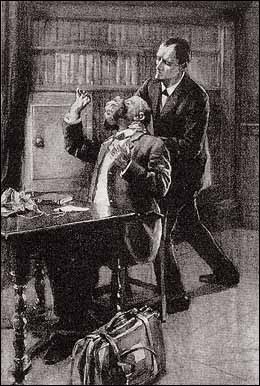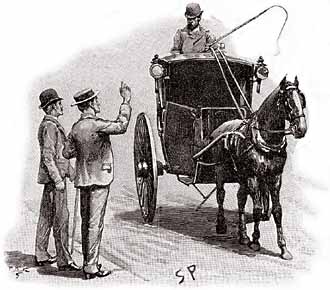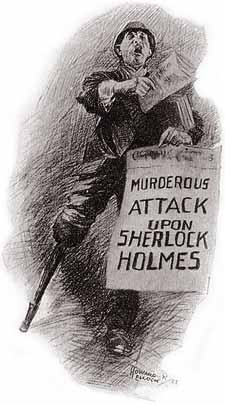[Update: Please be certain you have the 100 question version below]
The first mystery of the 2021 Treasure Hunt is where the heck is it? Due to some miscommunication (or the interference of Moriarty, probably) it has been ready to go but never made it to the web. As a result, we will extend the deadline to September 5. Please send your answers to this year’s blameless Treasure Hunt Master, Richard Krisciunas, JHWS “Hector” at treasurehunt@johnhwatsonsociety.com.
Team/Individual Name(s):
Primary Contact if for a team:
Primary Contact email:
2021 JOHN H. WATSON TREASURE HUNT
1 point for every correct answer unless otherwise specified.
PART 1: WATSONIAN WORLD OLIO
1. How many wives did John Watson have? Name them all alphabetically.
2. What is a far Eastern intestinal inflammation caused by Salmonella?
3. What is an Augean stable for couch potatoes?
4. Who was thin as a narrow piece of wood and brown as a nut?
5. Bozo would have been proud of whom for being the glue?
6. The most famous “Angel” in the Canon, Hosmer, didn’t really exist. Can you name five others who were real? 5 points
a.
b.
c.
d.
e.
7. Name eight Canon kings without royal blood. 8 points
a.
b.
c.
d.
e.
f.
g.
h.
8. What was Nigel Bruce’s middle name?
9. What was Basil Rathbone’s middle name?
10. Dr. Watson frequently dispensed his favorite medicine, brandy. What other two medicines did he consider? 2 points
a.
b.
11. Which person in the Canon had been jollified?
12. What was found near a fictitious river near Xiamen?
13. Name three who were, initially, sentenced to death but spared? 3 points
a.
b.
c.
14. The official colors of the Baker Street Irregulars were chosen by Christopher Morley based on what item and which colors?
a.
b.
15. Who was the combined age of: when one became master of the house plus the number of crew on a ship lost at sea? 3 points
16. Two men played chess together in Lewisham 29 years before their almost namesakes met again in what Sherlockian story?
17. In reference to q. 16, what were the chess players’ names in the story? 2 points
a.
b.
18. He met his Maker while standing but no bullet was fired. Name the story.
19. In reference to q. 18, who died?
20. He hired a one-legged man to help him manage his blues. Name the boss, the man and the story. 3 points
a.
b.
c.
21. Watson thought Holmes could have rivaled which actor?
22. This poet’s Shakespearean pastiche was one of a kind. Who was the author and what was the title? 2 points
a.
b.
23.Two Scotland Yard inspectors used a term to compare a man and a woman with young, rowdy people who cause damage. What was the term?
24. In reference to q. 23, who were the two inspectors? 2 points
a.
b.
25. In reference to q. 23, who was the man?
26. In reference to q. 23, who was the woman?
27. [The sum of the numbers of two unused upper circle tickets] – [The house number of the address where the wife with aroused suspicions exited the cab] + [The number of minutes in a first-class carriage ride to Birmingham] ÷ 2/3 = [What Canonical plant]? 4 points
28. There was confusion caused by two individuals in a story having the same initials. Name the three pairs and the three stories where this confusion occurred. 6 Points (2 points each)
a.
b.
c.
29. How many places could Holmes go to disguise himself?
30. Sherlock Holmes allergy to cats affects his ability to solve a case in a short story by what famous writer?
31. According to one canonical Mister, this person was more of an expert than Holmes. Who was the person?
32. Which military fencing champion portrayed Sherlock Holmes in the movies?
33. One was short-sighted, another naturally blind, the third missed a train. Two died and one survived. What did the three have in common?
34. In reference to q. 33, who were the three persons? 3 points
a.
b.
c.
35. Who was the man from Gdansk who Holmes showed how it really happened?
36. Who was the first voice to speak after host Brad Keefauver on the first episode of the Watsonian Weekly podcast?
37. In reference to q. 36, what topic did the person discuss?
38. Who composed the theme song for the Watsonian Weekly podcast?
39. Two characters had the same surname; one a future bridegroom, one a lawbreaker. Who were they? 2 points
a.
b.
40. Which woman did Holmes compare to a chicken?
Part 2: LONDON NEWSPAPERS
Name the Daily newspaper and the story in which the item mentioned appeared:
2 points for each correct pair of answers
41. This newspaper labeled the crime as a political one.
42. This newspaper’s advertisement sheet was thrown aside by Sherlock Holmes.
43. This newspaper was picked up by Mycroft Holmes.
44. This newspaper was removed from Holmes’ knee by the accused murderer.
45. This newspaper reported a murder discovery made by the Parisian police.
46. This newspaper labeled one officer in charge as the smartest detective.
47. This newspaper reported a lady’s distress on a bus.
48. This newspaper was visited by Holmes and Watson at the end of a busy day.
49. This newspaper’s editor was beaten.
Part 3: UNTOLD STORIES
Sherlockians and pastiche writers love speculating about the untold adventures discussed by Dr. John H. Watson. Name the title of the untold adventure and the story in which it appeared. 2 points for each correct pair of answers
50. Petroselinum crispum
51. Costermonger pushcart
52. Don’t judge a book by its cover
53. Wind up
54. Umbrella
55. Dentures
56. Toothless
57. Fake
58. Peerless
59. Plague
60. Understood by one
61. Female but not a woman
62. Powderless
Part 4: HOUSEKEEPERS IN THE CANON
Identify the housekeeper by the clue.
63. She didn’t notice the scratch.
64. She slept through the night and heard nothing.
65. She didn’t hesitate to let them in.
66. She was mistakenly arrested.
67. She was hard of hearing.
68. She was old but respectable.
69. She found the fingerprint.
70. She had a black cat.
Part 5: WATSONIAN WORD OLIO CONTINUED
71. An electrician, a solicitor, a marine, a second son and a cashier walk into a bar in London, what do they all have in common?
72. In reference to q. 71, name with whom? 5 points
a. Electrician/
b. Solicitor/
c. Marine/
d. Second son/
e. Cashier/
73. Dr. John H. Watson mentioned two people who he knew in Afghanistan. Who were they? 2 points
a.
b.
74. He once made the beer, and he was responsible for the introduction. Who, who and who? 3 points
a.
b.
c.
75. More than likely it was this ten-year-old best-selling text Watson laid aside when he lost interest due to the weather. What text? Which author?
76. John H. Watson’s literary agent was quite taken with this person’s Holmes-like power of disguise when the person was acting like Holmes. Who?
77. This Madame appeared in the world of Sherlock Holmes and Dr. Watson almost 30 times. Who?
78. Supply the missing names. 6 points.
a. Douglas:: Nigel:: ?, ?
b. Benedict:: Martin:: ?
c. Jeremy:: ?, ? ::Rosalie
d. ?:: Colin:: Sarah
79. In an apocryphal tale, Watson patiently and quietly accepts Sherlock Holmes’s error as to the doctor’s background as Holmes describes a letter Watson has received. Watson reports Sherlock Holmes saying to him, “This I gathered from the use of the word ‘Doctor’ upon the address, to which, as a Bachelor of Medicine, you have no legal claim.” Which word in Holmes’s statement is false?
80. Holmes, after some gentle searching near the light, found the hiding place for a short shotgun. Where was the hiding place?
81. While Watson did not exactly call it an alternative, he chose this public version over a home version. What?
82. According to Sherlock Holmes, a little talk about this produces the desired appearance of mental disturbance. A little talk about what?
83. Bow windows are mentioned as existing in four different places in the Canon; what four places?
4 points
a.
b.
c.
d.
84. While it rained frequently in London, only four persons in the Canon had an umbrella. Who were they? 4 points
a.
b.
c.
d.
85. Who were the two men in the Canon whose blood ‘boiled”?
a.
b.
86. Holmes offered a cigar and was sunk in deep thought at which railway station?
87. Her husband was an elected official in a town by the Cotswolds that houses the tomb of a king. Who was she?
88. Sherlock Holmes paid each of these six men a half-sovereign. Who were they? 6 points
a.
b.
c.
d.
e.
f.
89. Which author did Holmes say was always tersely cogent?
90. Sherlock Holmes studied the ashes of various tobaccos and smoked several cigarettes and pipes while contemplating his cases. To whom did Holmes offer a cigarette? 2 points
a.
b.
91. This newspaper reported a mid-May death. What was the paper?
92. While Holmes re-read a letter in October, Watson’s thoughts turned to a sandless beach in Southern England. What was the name of the beach?
93. Sherlock Holmes played the violin well and played it to take his mind off of bad weather. Who else was known to have played a violin in the Canon?
94. Two medical men in the Canon wore tennis shoes. Who were they? 2 points
a.
b.
95. Who was the unhappy, single, professional man who rang the bell at 221B?
96. Two men wore spats when they asked Sherlock Holmes for help. Who were they? 2 points
a.
b.
97. Arthur Conan Doyle was extremely athletic; swimming, playing golf, cricket, football (soccer), hockey and baseball. In what sporting activities did Sherlock Holmes participate?
2 points
a.
b.
98. Holmes described this man as having a heart of metamorphic rock. Who was he?
99. Two different items in two different stories the Canon cost the same price. Both were part of a set. What was the price?
100. In reference to q. 99, what were the different items and what were the two stories?
4 points
a.
b.
BONUS QUESTION
Sherlock Holmes relied on Dr. John Watson to help him with his cases. Can you decipher this story to find a hidden, well-known phrase that demonstrates Holmes’s reliance on Watson? 15 points
It was another cold, rainy morning where Holmes was looking at the agony column of the Daily Mail. Remnants of supper remained where Mrs. Hudson had placed them the night before. Seated in his chair was Dr. Watson who was warming his cold feet in the toasty fire that Hudson had just prepared. Outside, a man closed his umbrella and approached 221B Baker Street to ring the bell.
Holmes called to Mrs. Hudson, “We have a visitor. Stop what you are doing and let him in. Please tell Billy to open the door so that my friend Watson can help bring an end to this poor man’s suffering.
Looking worried, a stranger entered but Holmes laughed. “You need not worry because Watson’s here.”
As the man looked nervously around the room, Holmes noticed that Dr. Watson had taken out his revolver. Holmes reached for his pipe, inserted fresh tobacco from a Persian slipper that he had refilled from the previous day’s problem solving that involved members of Royal families from two different European nations.
“Don’t worry, old boy. My dear friend Is apprehensive. His sixth sense has caused him to expect that you are here with some problem that could bring serious danger to our home. I perceive he is incorrect.”
“One can never be too cautious.”
“Tell us what brings you. Elucidate your problem. I can see that no one has been able to help. Let us bring an end to your dilemma.”
The stranger’s face relaxed and a twinkle formed in his old eyes.
”This is what happened.”
He carefully explained his situation and then, Watson interrupted, “I solved it, Holmes!” Nothing gets past Dr. Watson.
“Great!,” Holmes said, and the man left happily.





